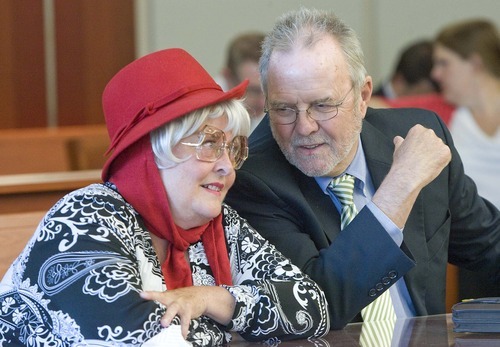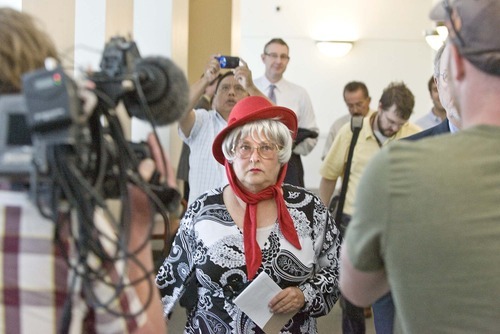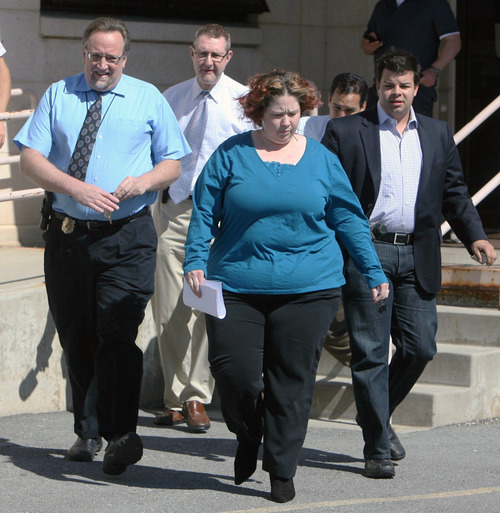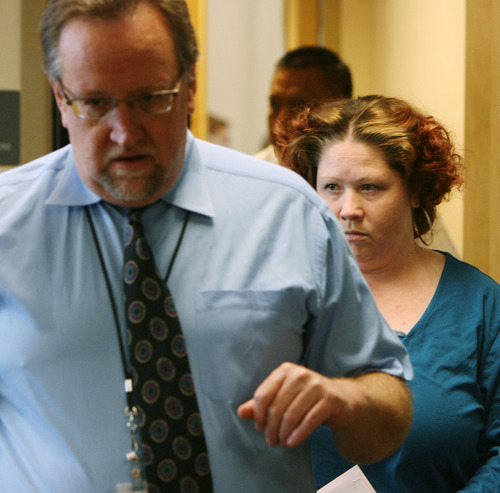This is an archived article that was published on sltrib.com in 2011, and information in the article may be outdated. It is provided only for personal research purposes and may not be reprinted.
She didn't want to help at first.
But Leah D. Carson said her Department of Workforce Services co-worker, Teresa Bassett, kept complaining about undocumented immigrants and working to create a list of them for immigration officials.
It was Bassett who was giving Carson rides to work, extra household items and a little money to help Carson and her five children. Carson even called her "Mommy."
"It's like she's helping me out," Carson told investigators from the Utah Attorney General's Office between nervous laughs. "I wanted to help her out."
So in mid-March 2010, Carson began giving Bassett small sticky notes, Carson said. On each one was the name and personal information of someone Carson believed was an undocumented immigrant receiving state assistance. Between Bassett and Carson, the list eventually had the names and personal information of about 1,300 people.
Carson said a previous Workforce Services computer system contained a field for workers to note undocumented immigrants, who were identified by a field marked "IA" for illegal alien. But the field disappeared with a change of computer systems, leaving the two women to look for clues as to who was undocumented.
Bassett told Carson she wasn't a racist.
"She hated people in general," Carson told investigators. "She didn't care what color their skin was."
Carson would later have a change of heart about giving information to Bassett.
"I came to my senses, but it was a little too late because I had already given it to her," she said.
Carson's version of events is recounted in 31/2 hours of video from her interview with investigators as well as 180 pages of court documents and reports obtained through a Utah Government Records Access and Management Act request. Carson, 32, did not respond to a request for comment.
Loni DeLand, the defense attorney for the 59-year-old Bassett, on Friday confirmed his client liked Carson.
"I guess you can say she felt kind of maternal toward her," DeLand said.
Archie Archuleta, president of the Utah Coalition of La Raza, said Carson's explanation renewed his view that her sentence of probation and a fine for a misdemeanor charge was appropriate and that Bassett should have received a stiffer sentence.
"Bassett seems to have been the real instigator and the most dedicated toward punishing the undocumented, and Carson seems to have been a dependent, maybe dupe of hers," Archuleta said.
Assistant Attorney General Scott Reed on Friday repeated his earlier position that finding a criminal statute that fit Bassett's actions was difficult. Also, Bassett was a first-time offender accused of a nonviolent offense.
Archuleta also questioned why Workforce Services ever recorded who was an undocumented immigrant. Archuleta said it "indicates an immigrant-hostile attitude." Curt Stewart, a spokesman for Workforce Services, did not know whether there was any such "IA" field and said staff who might know were unavailable Friday.
Records paint portraits of two very different women behind the list. When the list was revealed, it drew outcry from Latino advocates who said it intimidated immigrants. Opponents of illegal immigration called the defendants whistle-blowers.
Carson was living in subsidized housing and raising her children largely alone. She began her employment with Workforce Services as an intern in 2009 and did such a good job the department retained her full-time. Her co-workers seemed to like her.
They did not like Bassett, according to investigator documents. She had been employed with the state in various positions since 1995 and was transferred to the Workforce Services office in Midvale in February 2010 after Workforce Services eliminated her previous post. One Workforce Services employee said, "Bassett thought of her employment at DWS as a prison camp," according to an investigator's report.
Carson was assigned to train Bassett when she arrived at the Midvale office.
"She did not want to be there," Carson said. "She hated welfare. She hated anybody on welfare."
Bassett and Carson worked in a call and processing center. Even though Workforce Services no longer has the "IA" field, sometimes notes in a recipient's digital file would say that the caller was an undocumented immigrant but his or her children were U.S. citizens, Carson said.
"I want to make it clear," Carson told the investigators. "I never even noticed this stuff beforehand."
But Bassett did, Carson said, and began pointing people out. When Bassett first revealed to Carson her plan to compile the list, it was an accident, Carson said.
"She let slip, she said she had called [U.S. Immigration and Customs Enforcement] and she was going to get them all," Carson said. "She said she was going to get them all out of here.
"And I said, 'What?' And she said she had already called Immigration and made a deal with Immigration and she was going to get them all."
Bassett later explained she called ICE saying she had information about people in the country illegally but did not tell ICE who she was or where she worked, Carson said. Carson said Bassett claimed ICE told her to gather the information.
"I told her I did not want to be involved," Carson said, "but obviously that changed."
The relationship that started rocky morphed into a mother-daughter relationship. Bassett gave Carson dishes, towels and $60 cash. She took Carson and another co-worker to an expensive dinner at Little America hotel. When Carson's car broke down and her brother couldn't drive her to work, Bassett, whom Carson started calling "Mommy," took her.
Carson's own mother was a drug addict whom she had not seen in five years, Carson told investigators, and Bassett was about the same age as Carson's mother.
"She actually was a nice lady," Carson said, "She was just really bitter and negative."
Carson said she started passing Bassett information as a way of helping her but not necessarily her cause. Carson told investigators she didn't "even care" about illegal immigration.
She and Bassett were not able to run database queries. Instead, they compiled the list one aid recipient at a time as each individual called the Midvale office.
Carson said if she saw a notation indicating a caller was an undocumented immigrant, she would write down the caller's personal information, including names, addresses, phone numbers and birth dates. In some cases, she also wrote down where someone worked, if a woman calling was pregnant and the child's due date.
"I lost my good judgment there for a little while," Carson said.
Carson did not know how many notes she provided. At one point she said it was between 100 and 150. Another time Carson could only say she gave Bassett an entire pad of sticky notes. Bassett would enter the information into a spreadsheet Carson believes was stored on a thumb drive, Carson said.
"I was thinking in my head, 'These people are possibly going to have immigration people show up at their house and stuff,' " Carson told investigators. "And to be honest, I didn't care about them. I thought about their children, how that would be devastating to their children if one of their parents or both of their parents wound up getting deported."
Those fears prompted Carson to stop providing information in mid-May 2010. Sometime later, possibly in June, Bassett told Carson she was going to distribute the list to law enforcement, members of Congress and the media.
"And she said the reason why she was going to send it to the media was because if anybody was going to do anything about this problem, then it had to cause a stir," Carson said.
Carson said she told Bassett not to send the list — Workforce Services would realize where it came from and could trace every keystroke Bassett ever made on her computer. Bassett replied they wouldn't be caught.
Carson believes Bassett sent immigration officials one copy of the list in June. A second copy, which received the wider distribution, was sent the second week of July.
Bassett wrote an unsigned cover letter saying the list was compiled by a group called "Concerned Citizens of the United States" who found undocumented immigrants through observation and surveillance, investigators and prosecutors believe.
News outlets reported on the list on Monday, July 13. One Workforce Services employee heard the language in the cover letter and thought immediately it sounded like Bassett.
Carson heard the news at work the next morning when a supervisor sent an email to employees. The supervisor mentioned the list, said it was suspected of coming from Workforce Services and the agency would investigate.
"And I crapped my pants," Carson said.
Bassett was not at work that week because she was in the midst of being transferred to the Logan office. Carson called Bassett that night wanting to discuss the list, but neither woman actually brought it up.
On Thursday, Carson arrived at work and found her computer had been replaced.
"And I knew they knew," Carson said.
Carson initially denied any involvement other than knowing who had sent the list. She and Bassett were placed on administrative leave and later fired.
That night, Bassett arrived unannounced at Carson's home in West Jordan. Carson said Bassett told her to deny everything and that she had destroyed any evidence, including the thumb drive and her personal computer and had burned papers and flushed the ashes down the toilet.
Soon, Carson admitted her role in creating the list and began cooperating with prosecutors. On July 20, Carson called 911 after Bassett visited her home three times, Carson said.
On Jan. 6, Bassett and DeLand agreed she would provide handwriting and biological samples to investigators and met them at the Utah State University Police Department. Bassett wrote cursive when she was supposed to print, documents say, wouldn't provide a Social Security number or place of birth. Where she was supposed to write her mother's name, Bassett wrote "who cares," according to investigator documents. At one point, Bassett forcibly slid the pen back to investigators. When Bassett was supposed to provide fingerprint samples, she applied too much force and smudged the ink, the reports say. Bassett did allow a police officer to use an oral swab to take a DNA sample.
Investigator reports say at one point Bassett said someone must have accessed her computer while she was at lunch.
Throughout her recorded interviews, Carson laughs as she describes the creation of the list. She explained she laughs when she is nervous, but knew compiling the list was serious. "I know I was stupid," Carson says laughing. "I regret it now."
ncarlisle@sltrib.comTwitter: @natecarlislelwhitehurst@sltrib.comTwitter: @lwhitehurst —
About the convictions
Leah D. Carson pleaded guilty June 6 in Midvale Justice Court to a misdemeanor count of false statement by an unemployment compensation agent. A judge ordered her to serve 12 months of probation and pay $440 in fines and fees.
That same day, Teresa Bassett entered an Alford plea in 3rd District Court to two felony counts of computer crimes in which she maintained her innocence but acknowledged prosecutors had enough evidence to convict. A judge sentenced Bassett to 36 months of probation and 250 hours of community service. Earlier this year, Bassett legally changed her name to London Grace Wellington.









